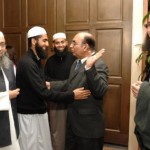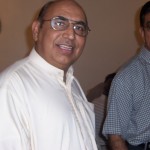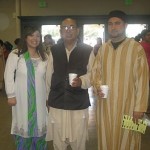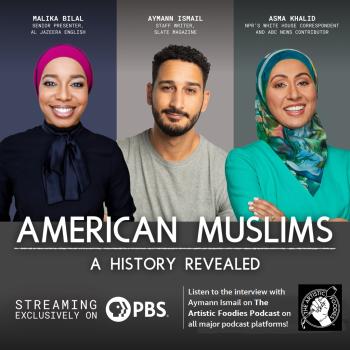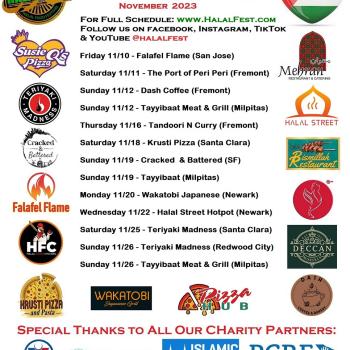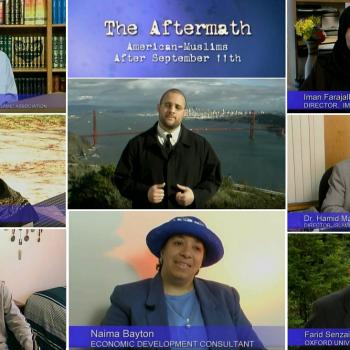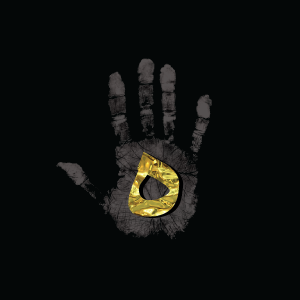I was just a college freshman then, as I sat face to face with Br. Abdul Sattar Rydhan, marhoom – Sattar Uncle, as I called him – at his home in San Jose. Tape recorder, notebook and pencil in hand, I was ready to begin my first interview for an assignment I had taken on in Dr. Hatem Bazian’s course on the development of Islam in America. It was mid Spring 2004 and like all the other lazy Muslim kids in Dr. Bazian’s class who opt for what they think will be an easy way out of UC Berkeley’s American Cultures requirement, I, as usual, had started months later than I should have. As the deadline loomed, I worried about not yet having enough material for my write-up. But after spending just a few hours in Sattar Uncle’s living room, my worry took a new twist: How would I fit all of this into one paper?
His story – full of creativity and action – began with the 1970s at Cal Poly San Luis Obispo, where Sattar Uncle was studying engineering and participated in the activities of the campus Muslim Student Association. From there I would hear about the transformation of student associations into community associations as single students turned into parents, and started worrying about raising children with strong Islamic values.
At the time, the nearest masjid to the South Bay was in San Francisco. There were no Sunday Islamic schools. Not a single Islamic advocacy organization.
As he spoke, I thought of how lucky I am to have grown up years after the first steps had been taken by Sattar Uncle and others like him. I thought back on my classes at the South Bay Islamic Association on Sundays. Those were a regular part of my weekly schedule as I grew up, and although I drove with my mom to school each week, I would rarely give thought to the people that had first made Islamic school a reality.
Three decades after masjids like the South Bay Islamic Association were first built; our community boasts numbers in the tens of thousands, countless organizations that advocate on behalf of Muslims, another countless set of Islamic service organizations, and dozens of masjids and halal meat stores.
It’s safe to say that much of these blessings are a result of the tireless work of our dear Sattar Uncle. Many in the community have already heard about his work in kickstarting Bay Area Media Watch – the precursor to the Islamic Networks Group, which a little more than 15 years back began teaching objectively about Islam and Muslims in local schools. We have also heard about his efforts in developing the American Muslim Alliance, which aims to bring the voice and concerns of Muslims in the United States to the mainstream political arena. He also put energy behind community outreach efforts and building strength in the news media, supporting such causes as the American Muslim Voice and a media outreach committee at the South Bay Islamic Association.
Although seeing these groups and participating in them as a young Muslim have always given me a sense of pride, I am even more grateful for the smaller, unrecognized efforts of Uncle Sattar.
I can remember back to my youth group class at Sunday School when my teacher took leave – Sattar Uncle came to fill the void. Alongside calmly covering difficult topics like tahara and the deeper meaning of the six fundamental beliefs, which often Muslim teens can struggle to comprehend, I remember enjoying him lightly poke fun at me and my classmates – and making the masjid a fun environment to join. I can also think back to the rare instances when I have arrived early to the Santa Clara County Fairgrounds for Eid prayer, and seen Sattar Uncle and family running from one corner to the other to make sure all arrangements are in order for everyone else. And who can forget the idea of halal Kentucky Fried Chicken with mashed potatoes and gravy at Juma each Thanksgiving?
Although while a child, all I knew of Sattar Uncle was that he told me to “wait a minute” to hear announcements after Maghrib prayers at Family Night on the first Friday of the month – announcements about moon sighting seem to be the most memorable – I have been blessed to have had the opportunity to appreciate the many different colors of the man as I grew older.
In the months before his passing, he even gave me a basic economics lesson: “Cash is king,” he said, with his hand movements amplifying each statement he made. “Buy low, sell high. Like that 1970s disco song, what goes up, must come down. And remember, money talks, everything else walks.” He was again poking fun – this time for my decision to take some economics courses. “You know what they say about the economist. . . He can only predict what has already passed,” he said with a grin on his face. He got quite a few chuckles out of me, as he spoke, and everyone else who decided to listen in.
Years earlier, I recall running into him unexpectedly atop the hills of UC Santa Cruz. It was the summer after my sophomore year of high school and I was just beginning a yearbook camp there. Uncle had come to drop off his daughter, Sana, for the development residency. Upon seeing the two of them and exchanging salaams, I remember feeling my respect for Sattar Uncle shoot up even higher. In that moment, I saw not only a father taking time out of his weekday afternoon to be a part of his family’s activities, but an uncle from my community who had the foresight and trust to allow his daughter to explore on her own. This was an exemplary leader who didn’t simply pay lip service to the need for media activism or women’s empowerment; I thought to myself – rather, he helped to instill these values in his own children.
It is with the blessings of Allah subhanawata’ala that more than a year since our dear Sattar Uncle left us; his legacy and our joyful memory of him still shine.
He touched lives wherever he walked – as I’m sure you can guess, in writing this article, I could have talked to at least a hundred people about Sattar Uncle’s impact on them personally. The fact is: he helped to build leaders. Alhamdulillah, each organization I mentioned earlier, to this day, works with the same unwavering spirit that Sattar Uncle carried.
Sadly, I don’t ever remember thanking him. Not once. And realizing that now really makes me wish I had.
Now, all I can do is pray for him, and his family. And I can tell others about my mistake. Let it serve as a reminder for all of us to thank the many other brothers and sisters who have toiled to build the Ummah we know today. The list of their names could not fit on these pages. Two probably just stood next to you during Juma prayer.
Let that be the suggestion I leave you with: Make du’a for Sattar Uncle and his family and his community after your next prayer today, and the next time you see someone you know has done great things for your community, thank them. Right there and then. You’ll be glad you did.
More importantly, put yourself to work. No harm in repeating the old adage: Your community is as good as you make it. Uncle’s family will need your help putting out the prayer mats on Eid day. The school principal will always be in need of a teacher. The community will need a voice in the media. The list can go on. As his active elder son, Irfan, reminded us all a year ago at the khatam for Sattar Uncle, “There is a lot of work we need to get done.” He said we could start by pitching in for a new sound system at the masjid as the old one had broken.
In the history Sattar Uncle began relating to me in his living room some five years ago, there was no ending. We need to build libraries, institutes of higher learning, where Muslims and non-Muslims alike come to study and read books about history and algebra and science, and the contributions of Muslims in these fields, he said. Not just about Qur’an and Sunnah.
Simply put, he was a visionary. A man ahead of his time. And he’s left us with a project – We owe it to him to get it done.


